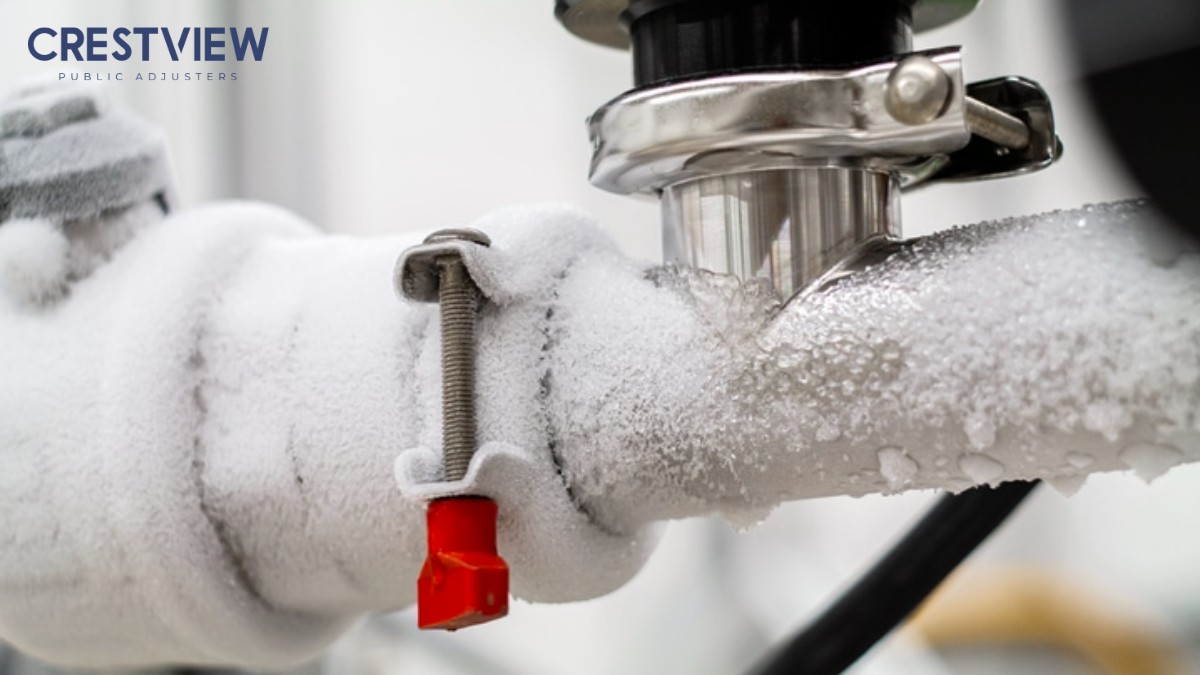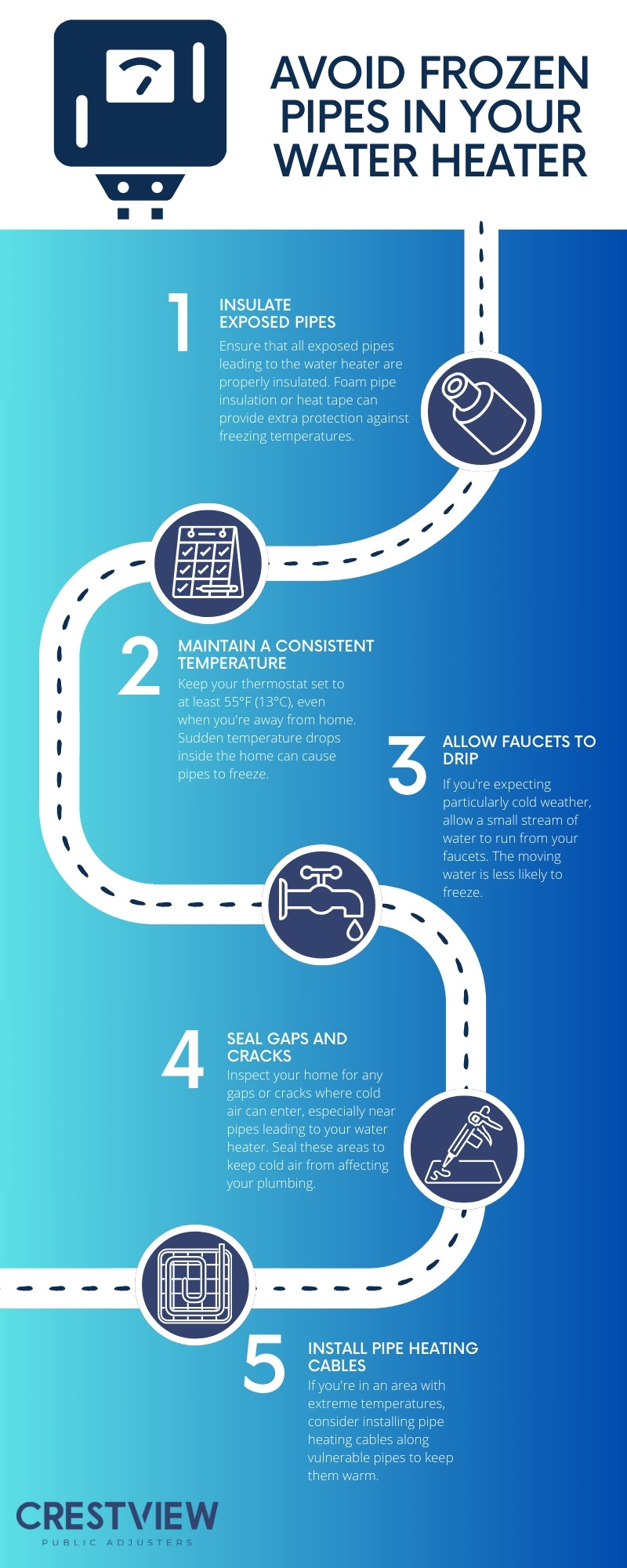Key Points:
- Frozen pipes leading to a water heater can cause extensive damage if not addressed properly.
- Quick action can prevent further damage by thawing the pipes safely.
- Hiring a public adjuster like Crestview can help you file frozen pipe claims in New York, New Jersey, and Florida.
Frozen pipes are a common problem in colder climates, with thousands of households across the U.S. facing the issue each year. In fact, according to the Insurance Institute for Business & Home Safety, frozen pipes are responsible for over $5 billion in property damage annually. While many know that freezing temperatures can cause pipes to burst, it is especially concerning when frozen pipes affect your water heater. Understanding how to handle a frozen pipe to water heater scenario is essential to minimize damage and ensure your system functions properly.
What Happens When a Pipe to Water Heater Freezes?
When it gets cold, the liquid inside tubes can turn solid and get bigger, which can cause the tubes to break. The consequences of frozen pipes leading to your water heater can be costly, especially if the pipes are not thawed out in time. A frozen pipe to water heater can disrupt your hot water supply, leading to inconvenient situations and potential long-term damage.
The freezing of pipes can block water flow, causing the system to fail entirely. The water heater could experience excessive pressure, increasing the risk of leaks, cracks, or even bursting in extreme cases. Beyond the inconvenience of no hot water, you also face the financial burden of repairs or replacement of the water heater and surrounding pipes.
In cold climates, where pipes are often located in unheated areas like basements, attics, or exterior walls, the risk of a frozen pipe to water heater becomes even greater. Quick identification and proper action can save homeowners from the worst-case scenario.
How to Identify a Frozen Pipe to Water Heater?
Detecting a frozen pipe early can make all the difference in preventing significant damage. The sooner you identify a frozen pipe to water heater, the easier it will be to thaw and restore water flow.
Common signs of a frozen pipe include:
- No Water Flow: If you turn on a faucet connected to the affected water heater and no water comes out, there’s a high chance that the pipe is frozen.
- Strange Sounds: In some cases, frozen pipes may make odd cracking or popping noises as they freeze or thaw. If your water heater is making strange noises, it could indicate that the pipe supplying it is frozen.
- Visible Ice: Sometimes, you can physically see ice inside exposed pipes. If you notice ice or frost on pipes leading to your water heater, you should act quickly.
Temperature Fluctuations: A water heater that isn’t maintaining a consistent temperature may be struggling due to a frozen pipe. If the water comes out cold and the heater is still running, frozen pipes could be blocking the flow.

How to Thaw a Frozen Pipe Leading to a Water Heater?
If you’ve confirmed that your pipe to the water heater is frozen, the next step is to safely thaw the pipe. Thawing the pipe should be done with care to prevent it from bursting or causing other damages.
Here are several methods to thaw a frozen pipe:
- Use a Hair Dryer: A hair dryer is one of the safest ways to thaw a frozen pipe. Set it on the lowest heat setting and work your way along the pipe. Keep the dryer at a safe distance to avoid overheating the pipe.
- Heating Pads: Electric heating pads can be wrapped around the frozen section of the pipe. They provide a consistent, controlled heat that can safely thaw the ice inside the pipe.
- Space Heater: A space heater placed near the affected pipe can also help warm up the area. Make sure to keep the space heater away from flammable materials, and don’t leave it unattended.
- Hot Towels or Cloths: Soaking towels in hot water and wrapping them around the frozen pipe can help gradually thaw the ice. Replace the towels regularly with fresh, hot ones to maintain the heat.
While these methods can be effective, it’s important to keep an eye on the situation as you thaw the pipe. If the pipe is stubborn or difficult to reach, consider contacting a professional to help you avoid further damage.
Preventing Frozen Pipes to Water Heater
The best way to address frozen pipes to water heater is to prevent them from freezing in the first place. Here are a few tips to protect your pipes during colder months:

Taking these preventive measures can save you from costly repairs and ensure your water heater continues to work properly through the winter months.
What to Do if a Frozen Pipe to Water Heater Bursts?
If your frozen pipe to water heater bursts, immediate action is crucial. A burst pipe can lead to flooding, structural damage, and an expensive repair bill.
Here’s what to do if a frozen pipe bursts:
- Turn Off the Water Supply: The first step is to stop the flow of water by turning off the main water valve. This will help prevent further flooding.
- Shut Off the Power Supply: If the burst pipe is connected to an electric water heater, immediately turn off the power supply to avoid electrical hazards.
- Inspect the Damage: Assess the extent of the damage to the pipe and water heater. In some cases, you may need to call a professional plumber to repair or replace the damaged pipe.
- Dry the Area: Use towels or a wet vac to remove any excess water from the surrounding area. This will help prevent mold growth and further damage to the property.
- Contact Your Insurance Provider: If your water heater and pipes are damaged, file a claim with your insurance provider to help cover repair costs. Public adjusters can be particularly helpful in getting you the maximum payout from your insurance policy.
Contact Crestview Public Adjusters for Frozen Pipe Claims
Dealing with frozen pipes, especially when they lead to your water heater, can be a stressful experience. If you’re facing property damage due to frozen pipes in New Jersey, New York, or Florida, Crestview can help you navigate your insurance claim. As expert public adjusters, we specialize in handling frozen pipe claims and ensuring that you get the compensation you deserve.
Contact us today to speak with one of our knowledgeable adjusters and get your claim process started. Let us take the stress out of dealing with your frozen pipe to water heater situation.

